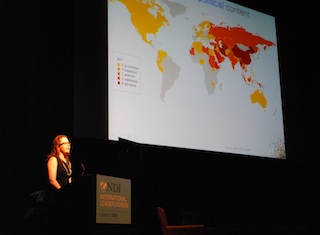Democracy Spotlight: Ginny Hunt on the Internet and Democracy

Cross-posted from NDI's ILF live updates.
We know the Internet has been a tremendous tool for growing economies, but how can it strengthen civil society and democratic governance? Ginny Hunt, global civic innovation manager at Google, addressed this question to the audience during the ILF "Democracy Spotlight."
A free and transparent Internet is transforming the interactions between government and citizens. Already, more than 6 billion devices connect people to the Internet, a number which is expected to triple in four years. Innovators continue to make networks faster and citizens increasingly have access to information in real time. The shear quantity of information is also growing. “Every minute, 72 hours of video footage is uploaded to YouTube,” she said.
Fast new ways of communicating and vast quantities of information online can be intimidating to governments, which are used to controlling information or at least using familiar information channels. Some governments have responded by filtering, monitoring and censoring what people read and share. According to Hunt, one-third of Internet users live in countries where the Internet is heavily filtered.
Not only is censorship antithetical to human rights, said Hunt, it also has a negative impact on the economy. The private sector has benefited from open Internet. Lack of communication and free speech has consequences for innovation and economic growth: high levels of Internet freedom correlate with high levels of education and innovation. And the Internet does not necessarily harm more traditional industries; according to Hunt, the web creates 2.6 jobs for every job that it renders obsolete.
So how can the public sector benefit from open Internet like the private sector has?
Hunt pointed to Google for examples. Google partnered with several U.S. states to standardize election data and help voters find basic information about the electoral process. All 50 states eventually joined the effort. Google also partnered with Nigeria to provide information to citizens about polling places, and similar projects for getting information to voters are underway in Turkey and Mexico.
Emergency response organizations partnered with Google to create interactive maps during the recent hurricane Isaac. These maps included information on evacuation locations, road conditions, and linked up with live web cams to help citizens stay informed about events on the ground.
In closing, Hunt offered four concrete suggestions on what the public sector can do to benefit from open Internet. “First,” she said, “keep the web open.” Free and open exchange of information is a fundamental issue. “Second: organize that information.” Only when information is standardized and structured can innovators use it effectively. “Third: build partnerships.” Hunt emphasized the importance of a multi-partner approach — linking up public and private sectors and citizens. “Fourth: be ambitious!” Google’s success, Hunt said, is in part because Google gets excited tackling big problems.
